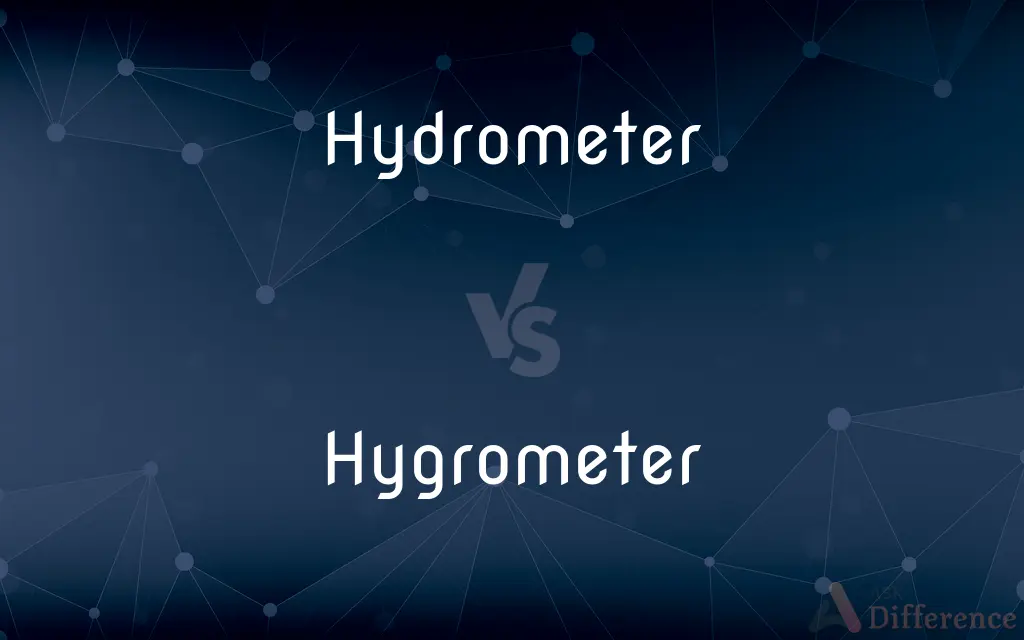Hydrometer vs. Hygrometer — What's the Difference?
By Urooj Arif & Fiza Rafique — Updated on April 17, 2024
Hydrometers measure liquid density relative to water, useful in brewing and battery maintenance, while hygrometers gauge atmospheric humidity, essential in meteorology and HVAC.

Difference Between Hydrometer and Hygrometer
Table of Contents
ADVERTISEMENT
Key Differences
A hydrometer is a device used to measure the specific gravity (or relative density) of liquids based on the concept of buoyancy. While a hygrometer measures the amount of humidity or water vapor in the air. This fundamental difference reflects their distinct applications in various fields.
Hydrometers are commonly used in industries where the concentration of substances in liquids is crucial, such as in winemaking or beer brewing, to determine sugar content. On the other hand, hygrometers are critical in meteorology for forecasting weather by measuring humidity levels.
The design of a hydrometer includes a weighted bulb and a stem with a graduated scale; it floats in the liquid, and the level at which it settles indicates the density. Whereas, hygrometers can vary widely in design, including hair-tension devices, dew point hygrometers, and electronic sensors.
Calibration is essential for both devices to ensure accuracy; however, a hydrometer is calibrated against a standard temperature and pure water. While hygrometers may require calibration against known humidity levels, often using saturated salt solutions.
Understanding how to read each device is also vital. For hydrometers, the reading is taken at the liquid's surface level on the graduated scale. While for hygrometers, the humidity level can be displayed digitally or via a dial, depending on the design.
ADVERTISEMENT
Comparison Chart
Primary Use
Measures liquid density
Measures atmospheric humidity
Measurement Basis
Buoyancy and density
Water vapor content
Common Uses
Brewing, winemaking, battery testing
Weather forecasting, HVAC, indoor air quality
Calibration Standard
Water at a specific temperature
Saturated salt solutions
Readout
Scale on stem where liquid surface meets the stem
Digital display or analog dial
Compare with Definitions
Hydrometer
Used to determine the concentration of solutions.
A hydrometer helps measure the sugar level in home-brewed cider.
Hygrometer
Critical in weather forecasting.
Meteorologists use a hygrometer to predict rain or fog.
Hydrometer
Floats in liquid to provide readings.
The hydrometer floated at 1.030, indicating the wine was ready for bottling.
Hygrometer
Used to maintain optimal indoor environments.
A hygrometer helps monitor the humidity in a greenhouse.
Hydrometer
Calibrated against water at a specific temperature.
Ensure the hydrometer is calibrated at 20°C for accurate measurements.
Hygrometer
Can feature digital or analog displays.
The digital hygrometer on the wall displays the humidity and temperature.
Hydrometer
Measures the specific gravity of liquids.
A brewer uses a hydrometer to check the fermentation progress of beer.
Hygrometer
Necessary for proper HVAC functioning.
HVAC systems often include a hygrometer to control indoor air quality.
Hydrometer
Essential in quality control in various industries.
In the battery industry, a hydrometer checks the acid strength of the electrolyte.
Hygrometer
Measures the moisture content in the air.
A hygrometer showed 80% humidity on a muggy summer day.
Hydrometer
A hydrometer is an instrument used for measuring the relative density of liquids based on the concept of buoyancy. They are typically calibrated and graduated with one or more scales such as specific gravity.
Hygrometer
A hygrometer is an instrument used to measure the amount of water vapor in air, in soil, or in confined spaces. Humidity measurement instruments usually rely on measurements of some other quantities such as temperature, pressure, mass, a mechanical or electrical change in a substance as moisture is absorbed.
Hydrometer
An instrument used to determine specific gravity, especially a sealed, graduated tube, weighted at one end, that sinks in a fluid to a depth used as a measure of the fluid's specific gravity.
Hygrometer
Any of several instruments that measure atmospheric humidity.
Hydrometer
An instrument that floats in a liquid and measures its specific gravity on a scale.
Hygrometer
(meteorology) An instrument that measures the humidity of the air or other gases, especially the relative humidity.
Hydrometer
An instrument for determining the specific gravities of liquids, and thence the strength spirituous liquors, saline solutions, etc.
Hygrometer
An instrument for measuring the degree of moisture of the atmosphere.
Hydrometer
An instrument, variously constructed, used for measuring the velocity or discharge of water, as in rivers, from reservoirs, etc., and called by various specific names according to its construction or use, as tachometer, rheometer, hydrometer, pendulum, etc.; a current gauge.
Hygrometer
Measuring instrument for measuring the relative humidity of the atmosphere
Hydrometer
A measuring instrument for determining the specific gravity of a liquid or solid
Common Curiosities
What is the purpose of a hygrometer in weather stations?
In weather stations, hygrometers help measure humidity, which is crucial for weather prediction and climate studies.
What does a hydrometer measure?
A hydrometer measures the density of a liquid relative to water.
How does a hygrometer work?
A hygrometer measures humidity by detecting changes in physical properties like temperature, pressure, mass, or a mechanical or electrical change in a substance as moisture is absorbed.
How do you calibrate a hydrometer?
Calibrate a hydrometer by placing it in pure water at a specific temperature and ensuring it reads the correct specific gravity.
How accurate are digital hygrometers?
Digital hygrometers are generally very accurate, often within ±1% to ±5% relative humidity.
When would you use a hydrometer?
Use a hydrometer in brewing to determine alcohol content, in winemaking to monitor sugar levels, or in maintaining lead-acid batteries.
Why is knowing the humidity important?
Knowing humidity levels helps in various applications such as meteorology, managing HVAC systems, and maintaining health and comfort indoors.
Is a hygrometer useful in a home setting?
Yes, a hygrometer can help manage air quality in homes, preventing mold growth and ensuring comfortable humidity levels.
Can a hygrometer measure temperature?
Some hygrometers, especially modern digital ones, can measure both humidity and temperature.
What are the different types of hygrometers?
Types include hair-tension, dew point, and electronic hygrometers, each using different methods to measure humidity.
What liquids can a hydrometer not measure?
A hydrometer is not suitable for viscous liquids or those with particles that might hinder the movement of the hydrometer.
Share Your Discovery

Previous Comparison
Highlights vs. Color
Next Comparison
Antigen vs. ImmunogenAuthor Spotlight
Written by
Urooj ArifUrooj is a skilled content writer at Ask Difference, known for her exceptional ability to simplify complex topics into engaging and informative content. With a passion for research and a flair for clear, concise writing, she consistently delivers articles that resonate with our diverse audience.
Co-written by
Fiza RafiqueFiza Rafique is a skilled content writer at AskDifference.com, where she meticulously refines and enhances written pieces. Drawing from her vast editorial expertise, Fiza ensures clarity, accuracy, and precision in every article. Passionate about language, she continually seeks to elevate the quality of content for readers worldwide.














































